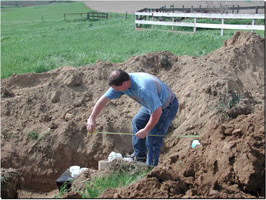Official Website for Harrison County, Iowa
- Home
- Communities
- Elected Officials
- Offices
- Public Works
- Contact Us

Environmental Health, Planning & Zoning
Contact Information

Administrator
Harrison County
Planning & Zoning/Env. Health
2nd Floor Courthouse
111 N. 2nd Avenue
Logan 51546
Hours
Monday - Friday
7:00 am - 3:30 pm
Phone
Members
Robin McClannahan
member
Wanda Moores
member
Jack Jones
member
Brit Liljedahl
member
Sarah Epperson
member
About the Department
The Environmental Health, Planning, and Zoning departments provide these services and more.
Currently, 45% of the private wells in the state, which serve 9% of the population, are considered unsafe for drinking due to bacterial contamination.
Also, nearly one in every five private wells contain unsafe levels of nitrite, a common challenge in agricultural states that use heavy levels of fertilizers.
Nitrite in water supplies can be life–threatening at certain levels and cause
‘blue baby syndrome’. The water testing program provides standards for construction of private water wells.
Enforcement of construction standards protects area drinking water aquifers from contamination.
The Environmental Health Department administers the Grants to Counties program, which includes water testing, well plugging, and well rehabilitation.
The Environmental Health Department offers water testing services free to any private well owner.
These water tests are used to determine the level of contaminants in the water sample and to verify that the water from the well is safe to drink.
Samples of water from the well site are collected in the county and sent to the Hygienic Lab at the University of Iowa in Iowa City for analysis.
Other services offered are well permits for new well construction & reconstructed wells and water well certification associated with property transfers.
On–site review and approval is required for all new well construction.
Information about grant assistance with the plugging of abandoned wells is also available. Contact Matt Pitt for more information or to make an appointment.

Homeowners interested in constructing a home away
from a city sewer system may contact the Environmental Health Department for information regarding the licensing and inspection of septic system construction.
County residents interested in having an existing septic system inspected for compliance with public health standards prior to the purchase of a rural property may also call for an on-site evaluation of the septic system.
The following inspections are required for new construction:
Site review to assure your location meets state and county standards.
During the construction process, prior to covering any portion of the system.
Final inspection, the administrator will give your system a final inspection and will draw a diagram of its exact location to be kept on file in the department.
Contact Matt Pitt for more information or to make an appointment.
The Environmental Health Department is charged with enforcing the county nuisance codes.
Zoning Information
Zoning information about a property may be obtained from the Planning and
Zoning Department. Information provided includes the zoning of a property, building setbacks, and subdivision regulations. All rural land inquiries should be made to the Planning and Zoning Department. A legal description or plat of survey must be submitted and the area identified on a digital photo.
The Zoning Administrator will make a determination, under the rules of the Harrison County, Iowa Zoning Ordinance. The Harrison County, Iowa Zoning Ordinance was adopted in February 1996 and provides the rules and procedures for zoning and building in Harrison County.
All changes in current zoning are made by the Planning and Zoning Board.
Zoning Commission
The Zoning Administrator acts as chief advisor for the Zoning Commission.
The Zoning Commission is responsible for changes in the current zoning regulations. The Commission serves in an advisory role to the Board, reviewing and making recommendations on implementation and updating the Harrison County Zoning Ordinance. This includes the zoning and rezoning or land and applications for subdivisions. The Harrison County Board of Supervisors can overturn a decision made by the Zoning Commission. Commission members are made up of five citizens appointed by the Board of Supervisors. Members serve 5 year terms and the majority live in the unincorporated areas of the county.
Current Zoning Commission Members:
Craig Kelley, Richard McIntosh, Wanda Moores, Carol Farley and Kim Reisz
E911 Rural Addressing
The Planning & Zoning Department is responsible for determining new E911 addresses for those properties in unincorporated areas of Harrison County.
These addresses are based upon an “addressing grid” developed for the entire county when the Emergency 911 Addressing went into effect. You must have an address assigned to receive telephone and other services.
Flood Plain Districts
The Planning & Zoning Department has flood plain maps for the entire county. These maps are published by the Federal Emergency Management Agency (FEMA) National Flood Insurance Program and are used to rate property in flood prone areas. This information is used to assess a property’s value and to assist in properly zoning the area. These maps area available for reference only and are not for distribution.
Certain areas in Harrison County have been zoned as Floodplain Districts (F-1). The F-1 district is designed and intended to be applied by the County to properties which lie within areas where special regulations are necessary in order to minimize the danger to life and property which results from flood waters.
These regulations are further intended to protect the floodplain from encroachments or developments which would obstruct, contain, or divert the passage of flood waters.
Permits
Permits to build are required for any new construction, reconstruction, or movement of any structure on a piece of property. Harrison County Planning & Zoning issues, sites, reviews, and approves all permits for rural areas in Harrison County.
Permit to build applications for new construction, remodeling, or repairs are available from the Planning & Zoning Department. These forms contain information necessary to properly process your request. Also, if your new construction will be using a private sewage disposal or water supply, you will need to have a permit issued before the building permit.
Filing Fee
A filing fee shall be charged for each application to assist in deferring the cost of administrative review and legal publication. The applicant shall be held responsible for submitting the required filing fees upon
submission of the completed application. No action shall be taken on any application until the required fee is paid in full.
Fee Schedule
The Zoning Administrator is directed to issue a building permit and/or occupancy compliance certificate as required by this ordinance for proposed construction, reconstruction, alteration, location or use.
There are no fees charged to the State of Iowa, the United States Government, or any other political subdivision. Contact the Zoning Administrator for current fees.
Fee Refund
Whether the request is granted or denied by either or both the Commission, County Board, or the Board of Adjustment, the applicant will not be entitled to a refund of the fee paid.
General Information
The Zoning Administrator acts as advisor to the Board of Adjustment.
The Board of Adjustment is a quasi–judicial board made up of five citizens appointed by the Board of Supervisors. The majority reside in the unincorporated areas of the county and serve five year terms.
The Board hears and makes the final decision of Appeals, which are questions between an applicant and the Zoning Administrator as to the proper interpretation of the zoning ordinance.
They also decide on applications for Special Exceptions as specifically provided in the Zoning Ordinance. The Board may authorize Variances in the application
of the Ordinance where there are unusual circumstances that would otherwise result in unnecessary hardship (physical, not economic) to a particular parcel of land if the Ordinance is literally enforced, and the variance would not be contrary to the public interest.
Current Board of Adjustment Members:
Larry Green
member
Lauren Roden
member
Patty Reisz
member
Mike Dickinson
member
Lynn Goodrich
member
Forms and complete requirements for applications to the Board of Adjustment are available in the office of the Zoning Administrator.
Appeals
Any person, including any officer or agency of Harrison County, aggrieved by a final administrative determination on a development permit or administrative development approval by the Administrator may appeal such final determination to the Board of Adjustment.
A written appeal must be filed with the Administrator within 30 working days after the date of the final decision. The appeal shall contain a written statement of the reasons for which the appellant claims the final decision is erroneous.
The Board of Adjustment shall fix a reasonable time for hearing of appeal, give public notice thereof as well as due notice to the parties in interest, including the owners of property within 500 feet of the property on which the appeal has been filed, and decide the same within a reasonable time. At the hearing any party may appear in person or by agent or attorney. A fee of $100.00 should be paid to the Administrator at the time of the notice of appeal is filed.
Special Exceptions
Special Exceptions are uses that are generally compatible with the permitted land uses in a given zoning district, but which require individual review of their location, design and configuration and the imposition of conditions in order to ensure the appropriateness of the use at a particular location within a given zoning district. Special Exception uses are listed in the district regulations for each zoning district.
A special exception shall not be granted by the Board of Adjustment unless and until:
A written application for a special exception is submitted indicating the section of this ordinance under which the special exception is sought and stating grounds on which it is requested. Notice shall be given at least 15 days in advance of the public hearing by publication in a newspaper of general circulation in the County. The public hearing shall be held. Any party may appear in person, or by agent or attorney. In reviewing an application for special exception, the Board of Adjustment shall consider the most appropriate used of the land; the conservation and stabilization of property values; adequate open spaces for light & air; concentration of population; congestion of public streets; the promotion of the public safety, morals, health, convenience and comfort; and the general welfare of the persons residing or working in the general area.
The Board of Adjustment shall make a finding that it is empowered under the section of this ordinance described in the application to grant the special exception, and that the granting of the special exception will not adversely affect the public interest. In making its finding, the Board of Adjustment shall, where applicable, duly consider the following:
Ingress and egress to property with particular reference to automotive and pedestrian safety and convenience, traffic flow and control, and access in case of fire or catastrophe; Off–street parking, loading and service areas where required; Economic, noise, dust, heat, glare, or odor effects of the special exception on surrounding properties; Utilities, with reference to locations, availability, adequacy and compatibility; Screens and buffers with reference to type, dimensions, character and adequacy; General compatibility with surrounding properties; Required yards and other open spaces.
Variances
A variance is a relaxation of the terms of the zoning ordinance where such variance will not be contrary to the public interest and where, owing to conditions peculiar to the property, and not the result of the actions of the applicant, a literal enforcement of the ordinance would result in unnecessary and undue hardship. Variances cannot be approved because of economic conditions, such as that it would cost more to build in compliance with the Zoning Ordinance.
In order to grant a variance, it must be found that the property cannot be used for any reasonable purpose within its current zoning district, unless a variance is granted.
The cost of removal of an illegally built structure does not constitute unnecessary hardship– it should not have been built in the first place. A variance also cannot be used to create a new non-conforming lot.
A variance from the terms of this ordinance shall not be granted by the Board of Adjustment unless and until:
A written application for a variance is submitted demonstrating:
That special conditions and circumstances exist which are particular to the land, structure, building involved and which are not applicable to other lands, structures, or buildings in the same district;
That literal interpretation of the provisions of this ordinance would deprive the applicant of rights commonly enjoyed by other properties in the same district under the terms of this ordinance;
That the special conditions and circumstances do not result from the actions of the applicant; That granting the variance requested will not confer on the applicant any special privilege that is denied by this ordinance to other lands, structures, or buildings in the same district.
No nonconforming use of neighboring lands, structures, or buildings in other districts shall be considered grounds for issuance of a variance.
Notice shall be given at least 15 days in advance of the public hearing by publication in a newspaper of general circulation in the County.
The public hearing shall be held. Any party may appear in person, by agent or attorney.
The Board of Adjustment shall make findings that the requirements of Section (a) above have been met by the applicant for a variance.
The Board of Adjustment shall further make a finding that the reasons set forth in the application justify the granting of the variance that will make possible the reasonable use of the land, building or structure.
The Board of Adjustment shall further make a finding that the granting of the variance will be in harmony with the general purpose and intent of this ordinance, and will not be injurious to the neighborhood, or otherwise detrimental to the public welfare.
Purpose & Objectives
This Zoning Ordinance is adopted to preserve and promote the public health, safety, peace, comfort, convenience, prosperity, and general welfare of the citizens of Harrison County, Iowa, all in accordance with and as permitted by the provisions of Chapter 335, Code of Iowa, as amended. More specifically, the Ordinance is adopted in order to achieve the following objectives:
1. To provide a precise plan for the physical development of the County in such
a manner as to achieve progressively the general arrangement of land uses depicted in the Land Use Plan.
2. To foster a harmonious, convenient, workable relationship among local uses and a wholesome, serviceable, and attractive living environment.
3. To promote the stability of existing land uses which conform with objectives and policies of the Land Use Plan to protect them from inharmonious influences and harmful intrusions.
4. To ensure that public and private lands ultimately are used for the purposes which are most appropriate and most beneficial from the standpoint of the County.
5. To promote the beneficial development of those areas which exhibit conflicting patterns of use.
6. To prevent excessive population densities and overcrowding of the land with structures.
7. To promote a safe, effective traffic circulation system.
8. To foster the provisions of adequate off-street parking and truck loading facilities.
9. To facilitate the appropriate location of public facilities and institutions.
10. To protect and promote appropriately located agricultural, commercial, and industrial pursuits in order to preserve and strengthen the County's economic base.
11. To protect and enhance real property values.
12 To conserve the County's natural assets and to capitalize on the opportunities offered by its terrain, soils, vegetation, and waterways.
13. To coordinate policies and regulations relating to the use of land with such
policies and regulations of incorporated municipalities of the County in order to: facilitate transition from county to municipal jurisdiction that land which is first developed in an unincorporated area and is subsequently annexed to amunicipality;
foster the protection of farming operations in areas of planned urban expansion, and ensure unimpeded development of such new urban expansion that is logical, desirable, and in accordance with objectives and policies of the Land Use Plan.



